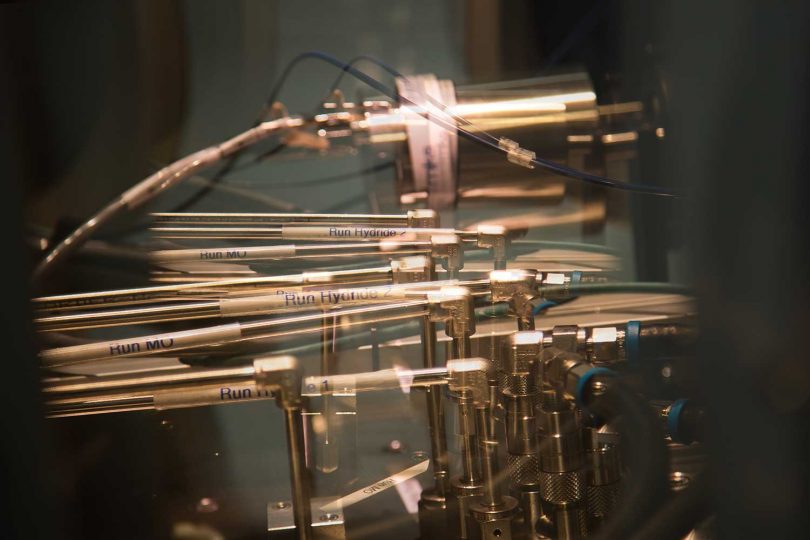Parliamentary Evening in Berlin presented research “Made in Braunschweig”
Joint press release
Stadt Braunschweig, Deutsches Zentrum für Luft- und Raumfahrt (DLR),
Physikalisch-Technische Bundesanstalt (PTB), Technische Universität Braunschweig, Volkswagen Financial Services
What will mobility look like in the future? What do technological developments mean for our social life and how will this change the world of work? These were the questions addressed at the joint parliamentary evening organised by the city of Braunschweig and leading national research institutions from Braunschweig yesterday, Thursday, at the Niedersachsen State Representation in Berlin. The message: tomorrow’s mobility is being developed as a joint project in the Braunschweig region. The leading research institutions in this field, such as the German Aerospace Centre (DLR), the Physikalisch-Technische Bundesanstalt (PTB) and Technische Universität Braunschweig, gave an insight into their research and painted a picture of the future of digital and autonomous mobility. Volkswagen Financial Services AG, Europe’s largest automotive financial services provider based in Braunschweig, presented a new mobility platform currently under development.
Braunschweig’s mayor, Dr Thorsten Kornblum, who initiated the parliamentary evening, welcomed around 200 guests from politics, science, business and the media. Greetings were given by Hubertus Heil, Federal Minister of Labour and Social Affairs, Olaf Lies, Niedersachsen’s Minister of Economic Affairs, Transport, Building and Digitalisation, and Hartmut Höppner, State Secretary at the Federal Ministry for Digital and Transport.
In short presentations, the research institutions gave insights into different aspects of their work and presented their projects in this future field with all its opportunities and challenges. It became clear that Braunschweig, with its scientific and economic networks, offers a productive field for interdisciplinary research cooperation on test fields and in real laboratories. The overall goal is to develop the fundamentals for safe, automated and networked mobility and to put them into practice in application-oriented and digitally integrated scenarios.
The Institute of Transportation Systems at the German Aerospace Centre (DLR) in Braunschweig is researching the design of the workplace for technical supervisors. Automated driving is not yet a reality on our roads. To speed up the introduction of self-driving vehicles, support is needed not only from a networked infrastructure, but also from remote monitoring. This can be provided by a remote operator who supports the vehicle – especially in situations that are beyond the capabilities of vehicle automation. Such issues, known as ‘human factors’, are combined at DLR with expertise in transport systems, vehicle concepts, artificial intelligence and much more.
The Physikalisch-Technische Bundesanstalt in Braunschweig is also focusing on tomorrow’s mobility. With their metrological expertise, the researchers want to ensure that “filling up” at the electric charging station also works for automated vehicles. At the Parliamentary Evening, they presented the ELVIS (Electric Vehicle Charger Inspection System) mobile inspection system, which can carry out metrological inspections of charging points directly on site. ELVIS pretends that the charging station is a “refuelling” vehicle and measures the actual amount of energy transferred.
Using VR technology, the guests at the Parliamentary Evening were also able to visit PTB’s TI-CAR research centre. The aim of the centre is to examine in detail the complex sensor systems of automated vehicles and their data networking in real and virtual test drives and to develop new measuring and testing methods.
There are still a number of hurdles to overcome before autonomous driving technologies can be brought to market and used on a large scale – these include technical issues as well as social acceptance and the political and legal framework. Scientists at TU Braunschweig are investigating how this can be achieved in the MIAMy project, one of eleven transformation hubs for autonomous driving across Germany. The Automotive Research Centre Niedersachsen (NFF) at TU Braunschweig and other TU institutes are dedicated to this project and many other aspects of mobility research. As part of the Parliamentary Evening, they will present the first self-driving shuttle RAION, which will be used as a passenger shuttle at the Braunschweig Research Airport from mid-2024. In the future, self-driving shuttles could be a solution for public transport in rural areas.
For Volkswagen Financial Services, the digitalisation that is permeating almost all areas of life is also changing the purchasing and demand behaviour of many customers in the automotive sector. Flexible access to a vehicle is becoming increasingly important, especially for the younger generations. The focus is increasingly on the use of the vehicle rather than direct ownership. This has an impact on the strategy of automotive companies. Volkswagen Financial Services is playing a key role in the development of a mobility platform and mobility app for customers of the Volkswagen Group brands.
The presentations were given by Prof. Dr Roman Henze (TU Braunschweig – NFF), Prof. Dr Michael Ortgiese (German Aerospace Centre), Dr Thorsten Schrader (Physikalisch-Technische Bundesanstalt), Prof. Dr Simone Kauffeld (Technische Universität Braunschweig – NFF), Dr Christoph Leicht (Physikalisch-Technische Bundesanstalt), Prof. Dr Axel Hahn (Deutsches Zentrum für Luft- und Raumfahrt) and Dr Christian Dahlheim (CEO, Volkswagen Financial Services). A speed dating session at the end of the official part of the event provided an opportunity for further questions and invited personal dialogue with the researchers.
Comments on the Parliamentary Evening
Dr Thorsten Kornblum, mayor of the city of Braunschweig: “Tonight sends out an impressive signal. For the first time, we have succeeded in bringing together the leading research institutions in the field of digital and autonomous mobility from Braunschweig to present themselves in Berlin. As the centre of Europe’s most research-intensive region and a strong location for innovation and business, we in Braunschweig are actively shaping the future of mobility and are pioneers in the field of intelligent transport infrastructure. I would like to thank our partners with whom we will continue to build on this momentum in the future.”
Prof. Dr Angela Ittel, President of Technische Universität Braunschweig: “Our work on solutions for the mobility of the future is a beacon in Braunschweig, throughout Germany and internationally. We see ourselves as shapers of social change. That’s why we look at mobility not only in terms of technological progress, but also and above all in terms of the consequences for society as a whole. We are pursuing three other interface topics with the same approach and high priority: sustainable aviation, infrastructure construction for urban mobility and energy-efficient computer hardware based on light.”
Prof. Dr Cornelia Denz, President of the Physikalisch-Technische Bundesanstalt: “The automotive industry is an important economic factor for Germany and is undergoing one of the biggest transformation processes in its history. The testing and validation of automated vehicles is increasingly viewed from a metrological perspective: The industry needs certification! This is exactly what we at PTB ensure through reliable and trustworthy metrology and measurement procedures. And: For the development of a metrologically digital quality infrastructure, the early involvement of metrology in the political discussion at national, European and international level is absolutely essential.”
Prof. Dr Karsten Lemmer, DLR Executive Board Member for Innovation, Transfer and Scientific Infrastructures: “DLR research always quickly finds its way into applications. DLR’s joint research with industry turns ideas into innovations. At the same time, DLR’s research facilities and test sites are used by public authorities, for example, to scientifically analyse regulatory issues for the ‘mobility of tomorrow’. In this way, we create the indispensable conditions for the automated and networked driving of the future. A good investment in the innovation pipeline – yesterday, today and tomorrow.”
Dr Christian Dahlheim, Volkswagen Financial Services AG: ” In order to operate our mobility platform successfully, we at Volkswagen Financial Services need extensive knowledge in the field of data analysis and artificial intelligence. The exchange between science and business is essential for this and has long been part of our daily practice. This is an important success factor for the Braunschweig region.”


